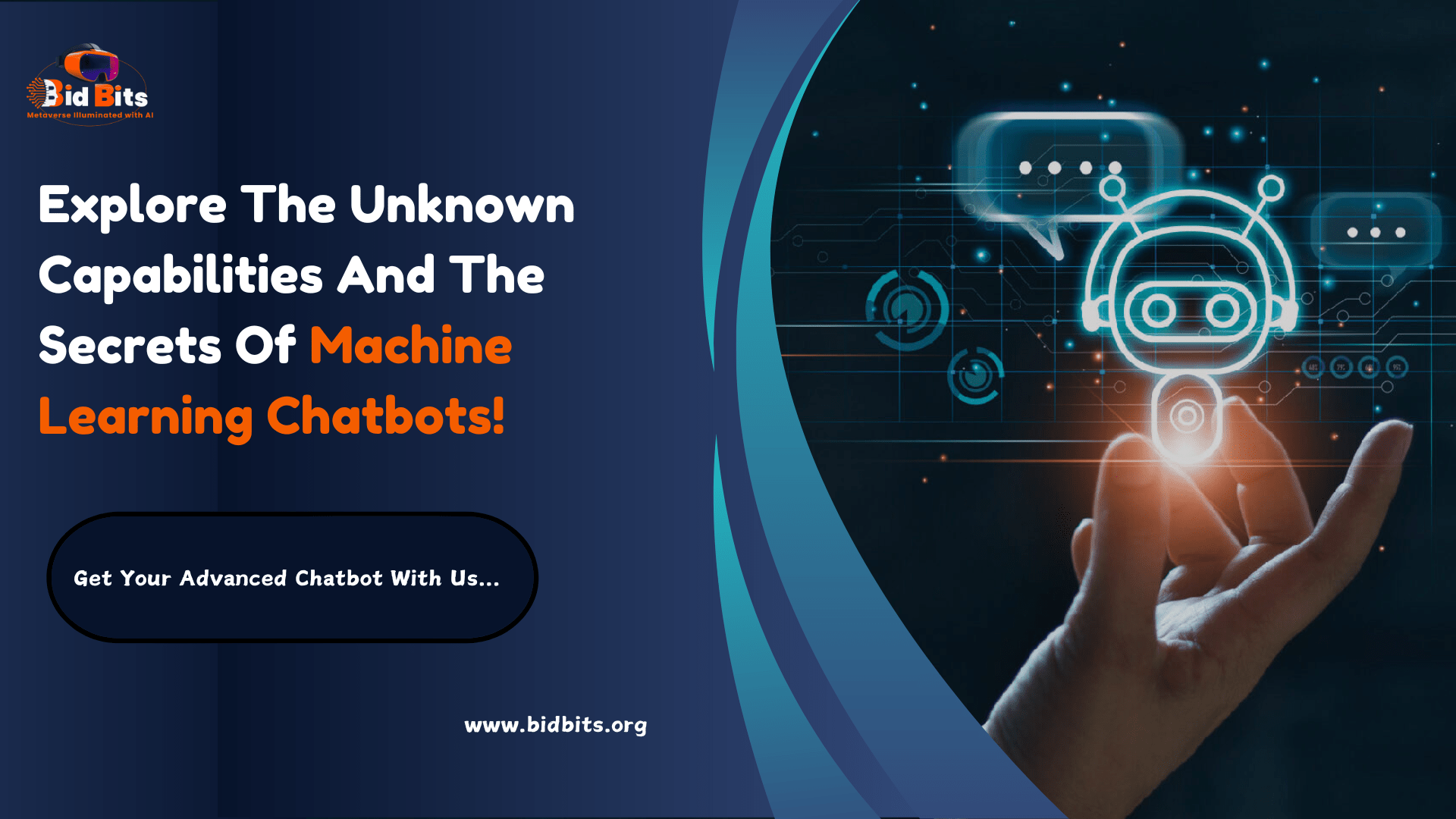Maximize Your Business Revenue With Next-Gen Machine Learning Chatbots Today!

Organizational success depends on effective communication, especially in the ever changing modern market. Chatbots using machine learning are changing the customer experience. It makes it easier for companies to communicate with customers, thereby improving operations and increasing sales. This blog will discuss these machine learning chatbots and the ways in which they are transforming many businesses.
Exploring The History Of Machine Learning Chatbots
Machine learning chatbots are smart platforms that try to talk like humans do, but they’re bots. Instead of following set scripts, they use fancy math to learn from talking to people and get better over time. This means they can handle all sorts of questions and adapt to what people want.
In the 1960s teaching computers to react to human speech didn’t really take off until the 1990s with ELIZA. It can ask and answer questions based on some keywords in your instructions. ELIZA isn’t very smart, but it’s a big step towards making computers more human.
Over time, scientists have developed more techniques for teaching computers to understand language. They started using something called “machine learning,” which was a nice way of saying it and teaching computers to learn patterns from data. This led to the creation of modern chatbots like ALICE in the early 2000s.
But it still has its limitations; They cannot understand complex sentences or hold long conversations. Then in 2010, as technology advances and data increases, chatbots become smarter. Companies like Apple, Google, etc have started creating chatbots, and today, we see chatbots everywhere, from websites to phones.
Key Features Of Machine Learning Chatbots
Natural Language Understanding (NLU)
Through advanced NLU algorithms, these chatbots analyze textual or speech inputs with remarkable accuracy, discerning nuances and grasping context effectively. This enables them to engage in meaningful conversations and provide relevant responses tailored to the user’s queries.
Learning from Experience
Like human intelligence, machine learning chatbots develop via experience. They continuously learn and adapt based on feedback from interactions with users. Whether it’s through explicit corrections or implicit signals, these chatbots leverage every interaction to refine their knowledge base and enhance their response capabilities.
Dialogue Management
Machine learning chatbots are excellent at managing conversations because they can adapt to the information that users impart and provide thoughtful, contextually relevant answers. This flexibility encourages more interesting and fruitful conversations and efficiently responds to user questions and concerns.
Data-Centric Approach
Central to the proficiency of machine learning chatbots is their data-centric approach. By analyzing vast repositories of past conversations and textual sources, these chatbots glean valuable insights into user preferences, commonly asked questions and optimal response strategies.
Types Of Machine Learning ChatBot:
- Rule-Based ChatBots
- Retrieval-Based ChatBots
- Generative ChatBots
- Hybrid ChatBots
- Task-Oriented ChatBots
- Open-Domain ChatBots
- Contextual ChatBots
- Voice-Activated ChatBots
Benefits Of Machine Learning ChatBot:
Customer empowerment: The capacity of machine learning chatbots to offer round-the-clock customer help is one of their main advantages. By speaking with customers one-on-one, they respond to inquiries promptly, provide answers, and even boost their level of confidence and happiness. They may also ensure that no consumer is left behind by managing several inquiries at once, which will encourage efficient delivery.
Productivity and cost savings: By automating tedious jobs and providing regular answers, machine learning chatbots greatly boost organizational productivity. By automating some operations, human resources may be freed up for staff to concentrate on more intricate jobs that need human involvement. As a result, the company saves a significant sum of money by cutting personnel expenses and boosting productivity.
Availability: Unlike timeless human agents, machine learning chatbots are available 24/7 and provide consistent support and assistance to all customers at all times. Additionally, the answers they provide are always accurate and free of human error, reducing the risk of misinformation and increasing trust.
Competitive advantage: Businesses using machine learning chatbots can gain a competitive advantage by providing superior customer service. Thanks to fast response time and personal interaction, they outperform their competitors in meeting customer needs, thus improving their reputation and business.
Instant Analytics: Machine learning chatbots are crucial for instant data and customer insights. By analyzing these interactions, businesses can identify patterns, trends, and pain points; thus allowing them to make informed decisions to improve products, services, and customer experience.
Simple expansion: As the business grows, the need for customer support continues to increase. Machine learning chatbots can easily solve more questions and provide solutions without increasing the associated cost. This scalability ensures uninterrupted support without any downtime, even during busy periods.
Following industry trends: Working with chatbot technology shows that the company is committed to innovation and following industry trends. In an era of significant digital transformation, the integration of machine learning chatbots demonstrates change and readiness to embrace new technologies, leaving businesses as the next audience and customer.
Enhanced data security: The learning chatbot is equipped with effective security measures to protect sensitive customer data. By adhering to strict data protection and encryption standards, they reduce the risk of data leakage and inaccessibility, thereby increasing customers’ trust and confidence in their privacy and confidentiality.
Industries That Support Machine Learning Bot
Healthcare Industry:
In healthcare, machine learning chatbots are revolutionizing patient care. They collect patient information, assist with check-in, transfers, and appointments, and provide patient updates. These chatbots are important assets for hospitals and clinics as they save doctors time and improve patient care.
Human Resources:
HR departments use chatbots to perform tasks such as initial candidate screening, processing new hire information, and internal inquiries. By working on this process, HR professionals can focus on the right activities, thereby improving overall results and performance in the organization.
Tourism:
Chatbots in the tourism industry provide a service environment to help customers ask questions, generate leads, and manage service quality. These chatbots collect and analyze customer data, providing personalized interactions that increase customer satisfaction and trust.
Banking Industry:
In the banking industry, chatbots provide information through information that helps in decision making. It simplifies operations and allows companies to focus on future planning and growth strategies. Furthermore, through interactive interactions, chatbots improve the customer experience and eventually boost customer loyalty.
E-commerce and retail:
Chatbots are essential to the growing e-commerce industry because they give a personalized shopping experience, and answer questions. Chatbots are key for increasing revenue and improving the complete customer experience because they break down barriers based on language and engage consumers across platforms.
Education Business:
Chatbots in the workplace allow students to learn about courses, admission procedures, deadlines, etc. It can help you get information about. By providing a supportive environment and access to information, these chatbots make learning easier and more convenient for students.
Land Business:
Real estate chatbots are assisting buyers with questions about property listings, prices, and virtual tours. These chatbots ensure that customers are happy and efficient during the home buying process by providing fast and accurate messaging.
Hotel business:
Machine learning chatbots manage reservations, provide service information and make recommendations to guests. Chatbots can improve customer experience and satisfaction by providing instant assistance and messaging.
Insurance Industry:
Insurance chatbots assist with customer queries, financial requests, pricing and FAQs. These chatbots increase the efficiency of the insurance industry and improve the overall customer experience by providing fast and accurate messages.
Conclusion:
Machine learning chatbots are changing the way businesses communicate, offering great efficiency, scalability, and customer interaction. By harnessing artificial intelligence and data insights, companies can unlock new opportunities, boost productivity, and deliver unique experiences. If you’re interested in developing machine learning chatbots, consider Bidbits as your chatbot development company. We blend web3 technology with our team’s expertise to create top-notch solutions. Our skilled data scientists and engineers specialize in crafting intelligent bots that can interact with users effectively.
Our focus is on creating bots that can handle tasks, improve performance through user interactions, and position your business as an innovator. Bidbits prioritizes security and scalability in chatbot development, ensuring results without compromising quality. We have a dedicated team that turns your ideas into successful products, driving your business forward. As we navigate the digital transformation landscape, machine learning chatbots will keep you ahead of the curve and redefine the future of work and connectivity.

